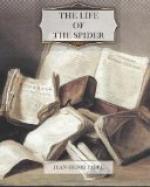But, on her side, the Penduline is a more devoted mother. For weeks on end, squatting at the bottom of her purse, she presses to her heart the eggs, those little white pebbles from which the warmth of her body will bring forth life. The Epeira knows not these softer passions. Without bestowing a second glance an it, she abandons her nest to its fate, be it good or ill.
CHAPTER III: THE NARBONNE LYCOSA
The Epeira, who displays such astonishing industry to give her eggs a dwelling-house of incomparable perfection, becomes, after that, careless of her family. For what reason? She lacks the time. She has to die when the first cold comes, whereas the eggs are destined to pass the winter in their downy snuggery. The desertion of the nest is inevitable, owing to the very force of things. But, if the hatching were earlier and took place in the Epeira’s lifetime, I imagine that she would rival the bird in devotion.
So I gather from the, analogy of Thomisus onustus, WALCK., a shapely Spider who weaves no web, lies in wait for her prey and walks sideways, after the manner of the Crab. I have spoken elsewhere {22} of her encounters with the Domestic Bee, whom she jugulates by biting her in the neck.
Skilful in the prompt despatch of her prey, the little Crab Spider is no less well-versed in the nesting art. I find her settled on a privet in the enclosure. Here, in the heart of a cluster of flowers, the luxurious creature plaits a little pocket of white satin, shaped like a wee thimble. It is the receptacle for the eggs. A round, flat lid, of a felted fabric, closes the mouth.
Above this ceiling rises a dome of stretched threads and faded flowerets which have fallen from the cluster. This is the watcher’s belvedere, her conning-tower. An opening, which is always free, gives access to this post.
Here the Spider remains on constant duty. She has thinned greatly since she laid her eggs, has almost lost her corporation. At the least alarm, she sallies forth, waves a threatening limb at the passing stranger and invites him, with a gesture, to keep his distance. Having put the intruder to flight, she quickly returns indoors.
And what does she do in there, under her arch of withered flowers and silk? Night and day, she shields the precious eggs with her poor body spread out flat. Eating is neglected. No more lying in wait, no more Bees drained to the last drop of blood. Motionless, rapt in meditation, the Spider is in an incubating posture, in other words, she is sitting on her eggs. Strictly speaking, the word ‘incubating’ means that and nothing else.
The brooding Hen is no more assiduous, but she is also a heating-apparatus and, with the gentle warmth of her body, awakens the germs to life. For the Spider, the heat of the sun suffices; and this alone keeps me from saying that she ‘broods.’




